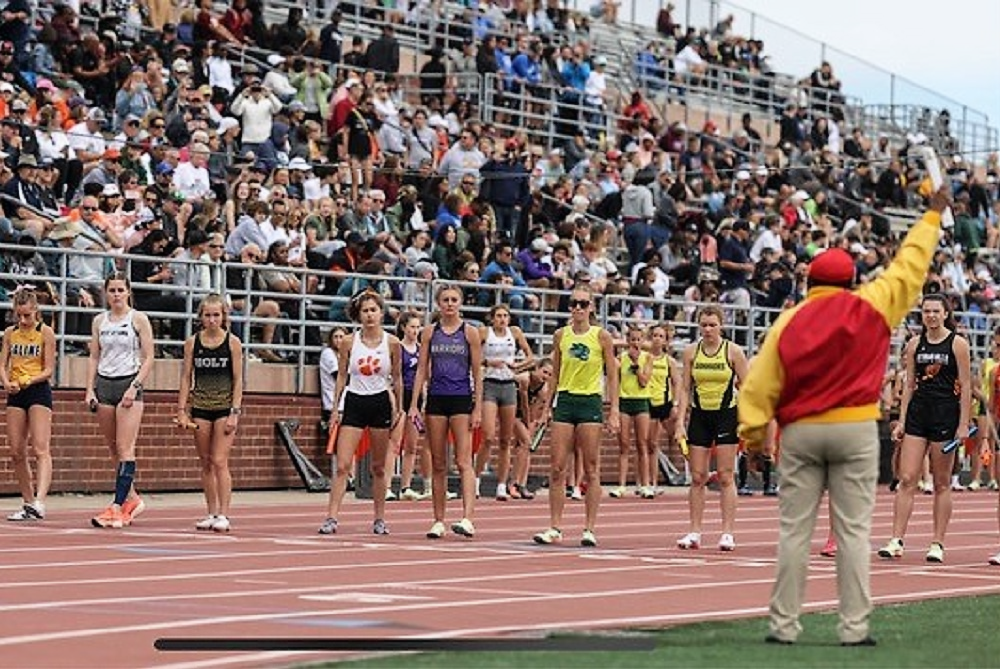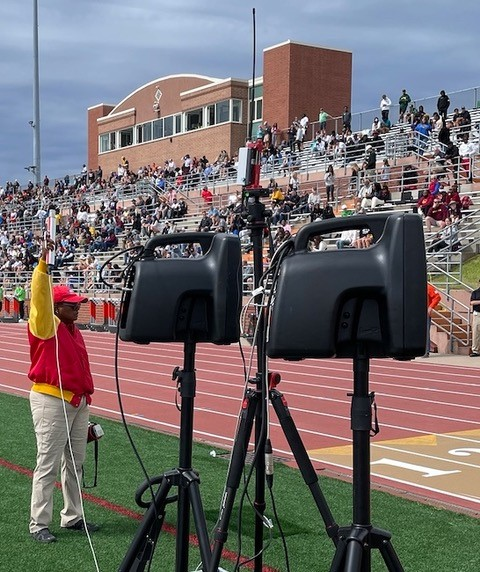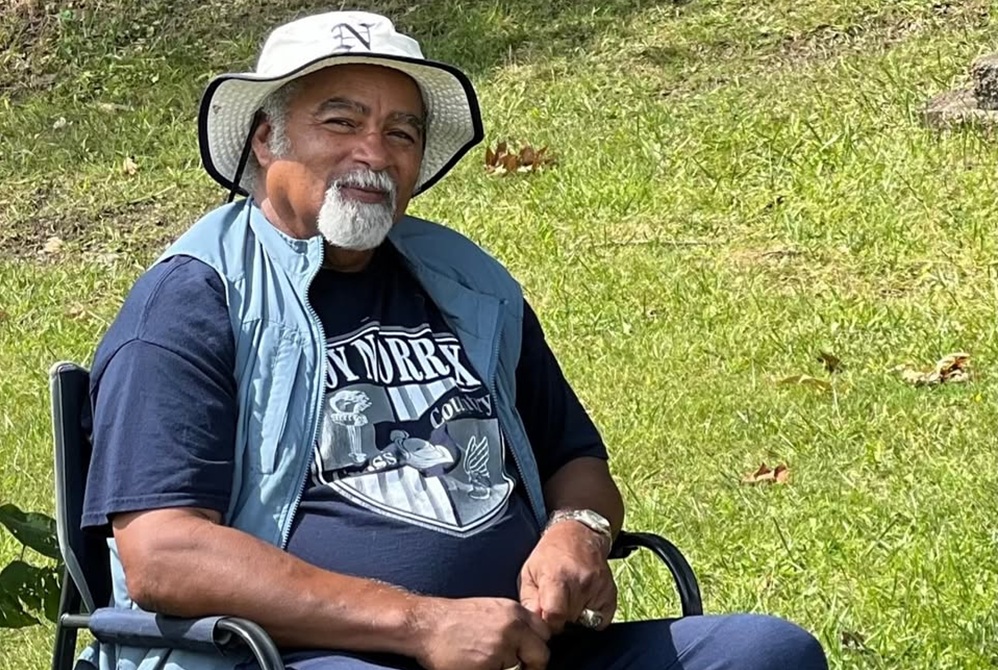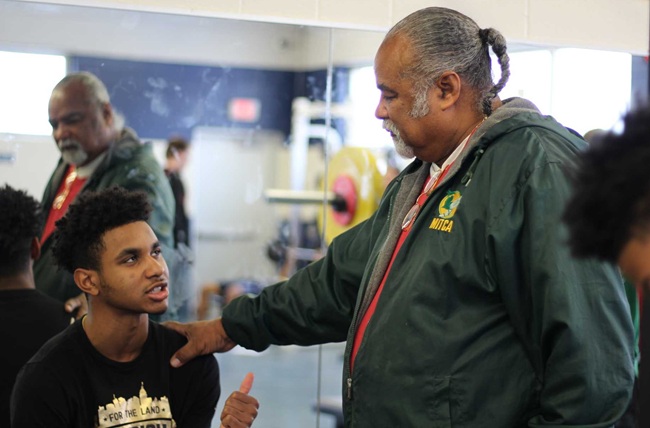
Track Gaining Speed Toward Future with Electronic Starting Devices
By
Steve Vedder
Special for MHSAA.com
May 23, 2023
Aubrey Greenfield thinks it might be the perfect time to reevaluate 130 years of tradition.
For a number of reasons, from technical to personal, the Oxford senior sprinter believes it makes sense for the crack of a starting pistol to be eliminated from high school track meets.
Because track meets would benefit in various ways from lowering costs to easier setup at meets to the human factor of competitors not having to flinch at the crack of a pistol shot, Greenfield believes the sport has a chance to embrace new technology – electronic starting devices (ESD).
In essence, an ESD replaces the starting pistol with a light flash, tone sound or both to begin a race.
"High school sports should put the athlete first," Greenfield said. "We should promote sports, and eliminating starting pistols promotes health in terms of PTSD or trauma for athletes and spectators and that would be good. I would like to think people would say that's a good idea."
In fact, Greenfield would go as far as to say if there was not an implementation of electronic starting devices, many of her teammates would have considered giving up the sport.
"If it's something that helps us compete safely, we're all for it," she said.
Greenfield's opinion apparently is spreading. Michigan High School Athletic Association senior assistant director Cody Inglis said the use of ESD makes it both affordable for meet starters and sensible for athletes and fans to rethink the use of starting pistols. While the MHSAA is not mandating electronic starting devices, it does promote the use of what Inglis calls "emerging technology." He notes that ESD are becoming the norm for organizations such as USA Track & Field, the NCAA and an increasing number of high schools.
 "I think we have to embrace new technology, and we think this will be something that takes hold," Inglis said.
"I think we have to embrace new technology, and we think this will be something that takes hold," Inglis said.
A key part of embracing ESD is the human element. The tragic Oxford High School shooting Nov. 30, 2021, that took the lives of four students while injuring seven others should not be relived even for a fleeting instance at a high school sporting event. Oxford athletic director Tony DeMare said the school began using ESD at every meet, including the MHSAA Lower Peninsula Division 1 Finals last June. He said that decision was embraced by virtually all schools Oxford encountered.
"We were very convinced that the alternative (of ESD) would promote a healthy attitude," DeMare said. "We were overwhelmed with the positive response. If a school was on the fence about it or might not be for it, I think we've started to see the tide turn in favor of people willing to listen and learn about electronic starting devices."
Inglis said the MHSAA is acutely aware of what the crack of a starting pistol can mean to athletes and fans.
"It's unimaginable what Oxford went through, and this is a small way we can help," he said. "We look at a (starting pistol) and think, ‘Could we do something else?’ It's a way of helping to solve a problem."
Over the last several years, the MHSAA has embraced finding an alternative to starting pistols. Inglis noted the discussion started with the cost and diminishing availability of 32-caliber ammunition that meet starters use. A box of ammunition, if it can be found, is around $75 a box.
In addition to cost, there is potential damage from excessive exposure to 150-plus decibels of sound generated by the traditional 32-caliber blanks. Medical studies show damage to ears caused by decibel levels above 120 dB.
The tragedy at Oxford accelerated the conversation.
Inglis said the cost of ESD can be likened to a school sinking money into artificial surfaces at football fields. Yes, there is a great cost at first, but over time money is ultimately saved. An ESD system itself ranges between $200 and $500. Speakers also may need to be purchased, but with ESD starting events like the 800 and 1,600-meter relays positioned near the outside lanes 8, 7, 6 and 5 would result in improved hearing by athletes at the start of a race.
There is one challenge with ESD that track administrators are working to overcome – lighting conditions that lessen the ability to see the ESD’s LED light or strobe when the button is pressed by a starter to begin a race. But that vision difficulty resulting from clear blue skies and backgrounds of setting suns can be substantially improved by incorporating a black background with an ESD – something as simple as a starter holding up black cardboard behind the lighting mechanism at the start of an event.
Inglis said when all factors are considered, the use of ESD makes sense.
 "With the climate we live in nowadays, no lookalike guns is good," he said. "We're not mandating this. But people are saying this is affordable."
"With the climate we live in nowadays, no lookalike guns is good," he said. "We're not mandating this. But people are saying this is affordable."
While switching to ESD would break 130 years of tradition, the timing could be a step forward, said Jeff Hollobaugh, co-author of the book "The Fleet Feet of Spring: Michigan's High School State Championships in Track & Field." He said while no definitive answer is possible, it's likely starting pistols were used at the inaugural state meet at the Jackson Fairgounds in 1895. The meet, which included events like tossing a 16-pound shot put, bike races and a 100-meter sprint, was sponsored by the Michigan Interscholastic Athletic Association (a predecessor to the MHSAA) and comprised mostly of the state's larger schools.
Hollobaugh's sentiments echo what many involved in today's high school track & field believe in terms of making a transition from starting pistols to electronic starting devices.
"It's a change, not necessarily good or bad, just different," he said. "It's not a drastic change, but it will take some getting used to. But it is the future. In the end, we'll all be fine."
DeMare believes the future of high school track will definitely include ESD.
"Our desire is that the practicality and sensibility of this will overcome the alternative," he said. "I think we'll see the automation and electronics taking hold of certain elements in track, and people will embrace it."
PHOTOS (Top) Runners watch official Bertha Smiley as they prepare to begin a race during last season's Lower Peninsula Division 1 Finals at Rockford. (Middle) An electronic starting device provided by VS Athletics was used to start those races. (Below) Smiley sets to begin an event. (Photos provided by David Kuderka/VS Athletics.)

Loy Norrix Mourning Death of Longtime Coach, Teacher Duckett: 'He's All Knight'
By
Pam Shebest
Special for MHSAA.com
January 19, 2026
KALAMAZOO — Theophlis Duckett, known to generations of students and alumni as the more familiar “Ted” Duckett, dedicated 57 years of his life as a teacher and coach at Loy Norrix High School.
After his unexpected death Jan. 8, people will have a chance to show their respect and share memories at a community celebration of life, Saturday, Feb. 14, from 11 a.m.-noon (with doors opening at 10:30 a.m.) at the Loy Norrix auditorium.
At age 79, Duckett continued to teach three classes of physical education as well as coach the Knights girls and boys track & field teams.
“There aren’t many educators who have worked as long as he has, especially all those years in the same building,” said Andrew Laboe, Loy Norrix’s athletic director. "He connected with kids very well. He had a generational following: kids, parents, their grandparents, their great-grandparents.”
Some memories of Duckett bring a laugh from Laboe, who said he and Duckett had a running joke about his years as a Knight.
“I’m 55 years old and I told him I was negative-2 (years old) when he started working here,” Laboe laughed. “I believe he was a parapro or a locker room aide when he started here.
“In the teachers union seniority list, he is listed as 1969-70 for his first year teaching.”
Laboe said in losing Duckett, the school and community have lost a great resource for his knowledge of the history of the school and the people connected to it.
“He knows everybody,” Laboe said. “He was a consistent person in the lives of the kids he taught every day. Kalamazoo is not small like a lot of small towns around us, but it’s not very big, either.
"Ted knows everybody. You could get help from Ted on everything about children, who are they related to, who they are connected to, who can we contact to help them in any situation. That’s very helpful.”
 During his tenure at Loy Norrix, Duckett coached football, basketball and track.
During his tenure at Loy Norrix, Duckett coached football, basketball and track.
“He’s definitely a good sprinter coach for track,” Laboe said. “He was a fixture at Loy Norrix forever. He’s all Knight.”
Duckett’s coaching tenure included developing several all-state football players. Among those were sons Tico and Todd, who continued their football careers at Michigan State and then the NFL.
Tico Duckett played for Washington while Todd was a first-round selection by Atlanta in 2002, and he also played for Washington, Detroit and Seattle.
Laboe laughs when he looks back on his first meeting with the coach.
“My first year (at Loy Norrix) was 2004,” Laboe said. “Ted came into my office the first day. I said, ‘Hi Mr. Duckett, how are you? I’m Andrew Laboe.’”
He told Laboe he already knew.
“He said, ‘I just want you to know you have one year to get all the information out of this head that you need to run this athletic department because I’m retiring in one year.’”
No matter how much Laboe got out of Duckett’s head that first year, it didn’t matter.
“I’ve been here for 22 years and he was still here. It’s crazy,” Laboe recalled.
“He’s one of a kind. I don’t think it will ever be replicated in my career. There’s not people like that anymore that are that dedicated to one school like Ted Duckett was to Loy Norrix.”
(Photos courtesy of the Duckett family and Loy Norrix High School/Knight Life.)

